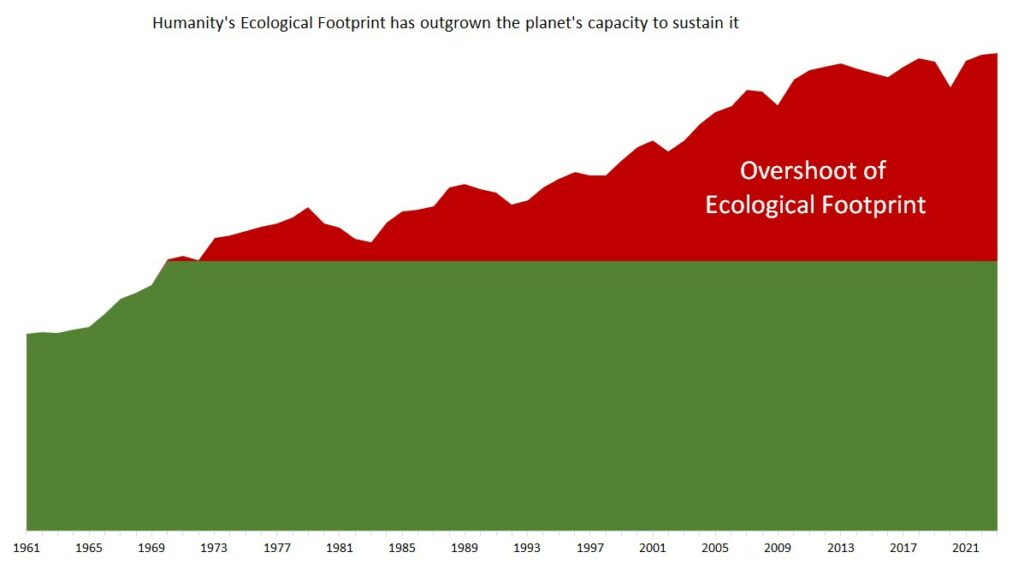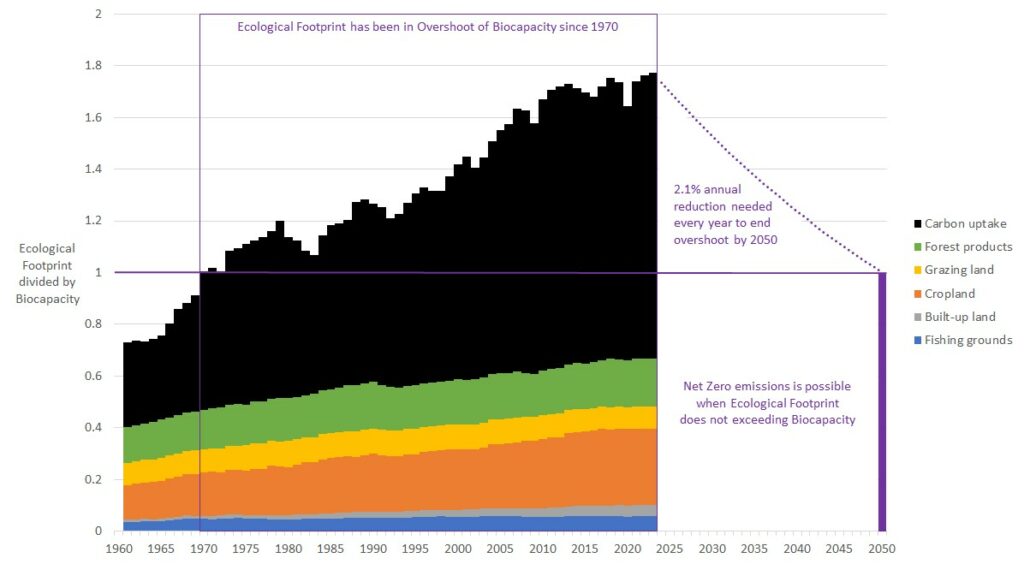
Record-breaking year of consumption leads to Ecological Footprint overshoot
Data generated by researchers at York University’s Ecological Footprint Initiative shows 2023 to be a record-breaking year for humanity’s Ecological Footprint, which is predicted to exceed what the Earth can regenerate this year by tomorrow (August 1) – Earth Overshoot Day.
All components of the Ecological Footprint – cropland, grazing land, fish harvests, built-up land, forest products, and carbon emissions – were larger than ever before.
The annual Overshoot Day prediction, based on data produced out of York’s Faculty of Environmental and Urban Change, continues to worsen.

“Earth Overshoot Day highlights excess consumption that needs to be reduced. It can also measure the significance of actions such as carbon pricing and reducing food waste,” says Eric Miller, director of the Ecological Footprint Initiative in York’s Faculty of Environmental and Urban Change. “Humanity needs to reduce its Ecological Footprint by 2.1 per cent annually, every year from now until 2050 to end overshoot. Ending overshoot is necessary to reach net zero emissions.”
The Ecological Footprint is calculated as the area occupied by settlements, plus the land used for agriculture, the waters used for capturing or culturing fish, the area of harvested forests, and the area of unharvested forests that would be needed to absorb humanity’s carbon emissions. Researchers also measured the biocapacity of lands and waters within all countries. Calculations integrated tens of millions of data points from international data sources.
Humanity needs to reduce its Ecological Footprint by 2.1 per cent annually, every year from now until 2050 to end overshoot.
Eric Miller
Canada is one of more than 140 countries that have committed to reaching net-zero emissions. More than 9,000 companies, 1,000 cities, 1,000 educational institutions, and 600 financial institutions have joined the Race to Zero to reduce emissions.
Net zero emissions can be achieved by reducing greenhouse gasses to the point at which their annual total can be sequestered by ecosystems within the same year. Ecosystems can only do this if they are not being used for other purposes, such as housing people, supporting infrastructure or being harvested. A comprehensive accounting of these different uses and capacities of lands and waters is provided by National Ecological Footprint and Biocapacity Accounts. This accounting is necessary for effective policy and legislation around the world.
“Our dataset is the most comprehensive and recent measure of what’s necessary for sustainability,” says Miller, who leads a team of researchers and graduate students to produce the National Ecological Footprint Accounts for the Footprint Data Foundation, a Canadian not-for-profit organization.

Quick facts
Mississauga and Toronto:
- 56 times the area of Mississauga was needed to support Mississauga’s Ecological Footprint.
- Toronto’s average per-person Ecological Footprint was lower than the Ontario average.
Ontario compared to the Canadian average:
- Ontario’s Ecological Footprint and biocapacity were measured in 2020 from 2005-2015.
- Ontario’s Ecological Footprint declined between 2005 to 2015, resulting from the end of coal-fired generation and changing diets in Ontario. The province’s Ecological Footprint declined to 11 per cent below the Canadian average, from a prior high of 14 per cent more than the average.
- Cropland in Ontario yielded almost twice as much than average cropland in Canada, and with yields above the world-average in 2015.
Ontario’s greenbelt:
- Ontario’s greenbelt provided an average of twice the level of biocapacity per hectare as other lands in Ontario. Most of this biocapacity was provided by cropland in the greenbelt.
- Ontario’s greenbelt yielded crops that could satisfy the total needs of 2.2 million Ontarians.
Canada compared to the rest of the world:
- An average consumer in Canada had an Ecological Footprint of 7.4 global hectare (gha). This was about the same as the United States average, higher than the Organization for Economic Co-operation and Development country average of 5.6gha, and much higher than the global human average of 2.6gha. More than half of Canada’s Ecological Footprint comes from burning fuels, followed by high consumption of forest products.
- More than four per cent of global biocapacity existed within Canada, ranked fifth highest in the world.
- Each dollar of Canadian exports required twice as much Ecological Footprint for its production than each dollar of imports. Canada exported footprint-intensive timber products, grains and edible oils, fuels and minerals.
York University:
- York University measures its Ecological Footprint and biocapacity and greenhouse gas emissions. Data published in 2023 shows that York University’s campuses in Toronto and Costa Rica provide one per cent of the land area needed to support its Ecological Footprint.
- York University’s emissions have trended below the Canadian university sectoral average.
- York University aims to achieve net-zero emissions by 2040.






